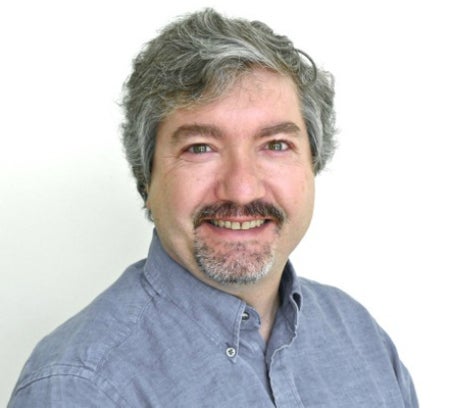Freericks Awarded Two DOE Grants
October 26, 2018 — Professor James Freericks of the Department of Physics has received two grants totaling $1.75 million from the U.S. Department of Energy.
The grants are both part of the Department of Energy’s recent $218 million initiative to promote quantum information science, which Secretary of Energy Rick Perry called “the next frontier in the Information Age.” Advances in quantum computing could lead to immensely more powerful supercomputers, sensors, and encryption devices.
Freericks is an expert on quantum physics, the study of how matter behaves in its smallest observable forms. He also made the news earlier this year when he was named the theory lead on a DOE-funded team to study X-ray scattering in solids.
HIGH-IMPACT APPLICATIONS
The first of Freericks’ grants will fund research on the quantum properties of systems that are driven and damped, like shock absorbers in cars. They’ll also be looking at frustration effects in magnets.
“The goal of this work is to find high-impact scientific applications on currently available quantum computers,” Freericks said. “The problem of how quantum particles respond to being pushed — by a field, like an electric field — remains one of the major unsolved problems in physics. Quantum computers are ideally situated to solve these problems, and the main objective of this work is to do this.”
Freericks and colleague Lex Kemper of North Carolina State University will partner with IBM, IONQ, and Intel, using quantum computers to analyze the systems. The grant will provide $1.25 million to fund a postdoctoral fellow and a graduate student at both universities for the next three years.
NEW SOFTWARE
Freericks is also part of a team working on a four-year, $8 million grant, that aims to develop software for use in quantum computing, which involves computers that use quantum principles rather than binary code.
“We take for granted that the real world can often be described as a system in equilibrium at a fixed temperature,” Freericks said. “It’s a well-known and difficult problem to set up quantum computers at a fixed temperature. The work supported by this grant seeks to find efficient ways to allow quantum computers to describe these real-world situations”
The grant is housed within Oak Ridge National Laboratory in Tennessee. At Georgetown, Freericks will test the software’s ability to solve complex scientific problems — in particular, how to initialize a quantum computer to solve how strongly interacting electrons in a solid behave. These systems give rise to exotic phenomena such as quantum entanglement, magnetic frustration, and high-temperature superconductivity. The grant will fund one graduate student to assist Freericks over the next four years.
